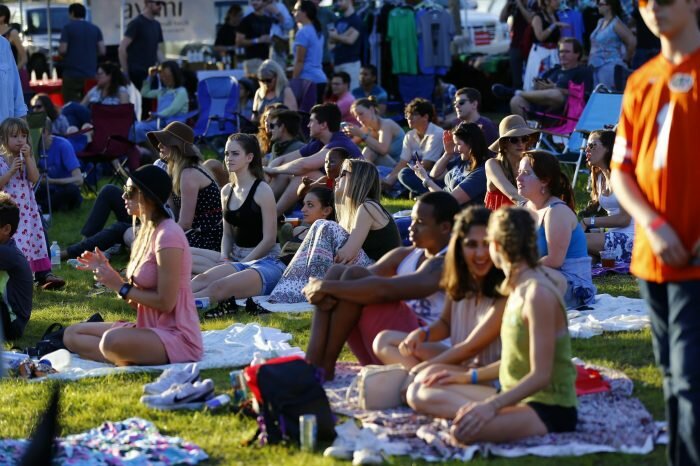Dov Waxman Sheds Light on the American Jewish Conflict over Israel

The Israeli-Palestinian conflict has been going on and off for over a century now.
The mainstream media have become wary of reporting on this often gruesome and seemingly unceasing conflict.The general American public remains divided on whether Israel’s actions or the Palestinian group’s, Hamas, actions can ultimately be justified in this complex conflict. Now, the American Jewish population has diverged in its levels of support for Israel.
Dov Waxman gave a lecture in Pugh Hall at the University of Florida on Monday evening. It was sponsored by the Samuel R. “Bud” Shorstein Professorship in American Jewish Culture and Society, the UF Center for Jewish Studies and the Bob Graham Center for Public Service.
Waxman is a professor of political science, international affairs and Israel studies at Northeastern University. His lecture focused on his thesis from his latest book: Trouble in The Tribe: American Jewish Conflict over Israel.
Waxman asserts that most American Jews still feel strongly connected to Israel, but they have become more divided over policies—primarily the Israeli-Palestinian conflict. Although most American Jewish people support Israel by hoping for its continued existence and caring for its future, they often feel uncomfortable with the way that Israel treats Palestinians.
Jewish American’s disagreement with Israel was previously something that was hidden from public discourse.
 “In the past, the American Jewish conversation about Israel was dominated by some of the powerful institutions in the American Jewish establishment,” said Waxman.
“In the past, the American Jewish conversation about Israel was dominated by some of the powerful institutions in the American Jewish establishment,” said Waxman.
But now dialogue and discussion of the conflict has erupted in the era of the Web 2.0, which has democratized communication by giving anyone the capability to have their voice heard through blogs and comments. An intense debate has erupted in the American Jewish community due to differing levels of support for Israel.A study done by Pew Research Center confirms Waxman’s findings:
“At the same time, many American Jews express reservations about Israel’s approach to the peace process. Just 38% say the Israeli government is making a sincere effort to establish peace with the Palestinians. (Fewer still – 12% – think Palestinian leaders are sincerely seeking peace with Israel.) And just 17% of American Jews think the continued building of settlements in the West Bank is helpful to Israel’s security; 44% say that settlement construction hurts Israel’s own security interests.”
Waxman believes that the American Jewish people’s debate about Israel is not only a debate about Israeli policy or actions, but also a debate about the appropriateness of the debate itself and the criticism of Israel it often carries alongside it.
Waxman’s findings ultimately had three major consequences.
The first consequence is that the debate over American Jews’ support for Israel is not going away anytime soon.

“I think that the debate will only intensify as Israeli domestic politics shifts further to the right, as the Israeli-Palestinian peace process remains deadlocked, and the two-state solution seems to disappear out of sight,” said Waxman.
The second consequence is that American Jews today are much less likely to possess unconditional support for Israeli policies. American Jews now more than ever want their voice to be heard by the Israeli government, which results in the Israeli government being forced to listen to American Jews if the Israeli government wants the continued political support of American Jews.
“Instead, they [the Israeli government] should expect growing American Jewish pressure upon them to change their policies, especially toward Palestinians,” said Waxman.
The final consequence is that the American government must realize that the American Jewish opinion on Israel is now divided, so powerful Jewish groups are not capable of speaking for the entirety of the American Jewish opinions.
“They [the American government] should also realize that growing numbers of them [American Jews], perhaps even an outright majority, would actually welcome more assertive American role in the Israeli-Palestinian conflict. One that might help finally bring about peace between the two sides.”





